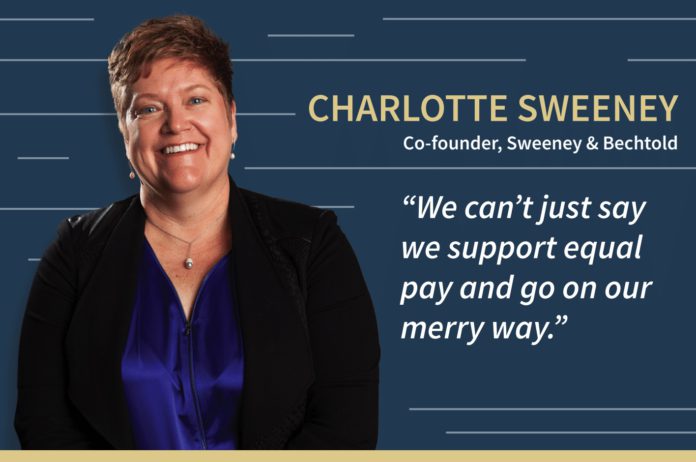
Employment attorney Charlotte Sweeney has been one of the key drafters of this session’s Equal Pay for Equal Work Act in Colorado, and she’s had a lot to bring to the table.
For two and a half decades, she’s been taking on employment discrimination cases filled with twists you couldn’t make up for a movie: a worker in the Department of Labor who couldn’t get an accommodation for her vision impairment and was then fired while her lawsuit was pending; a woman who worked as the chief hearing officer for Denver’s Career Service Board for several years before she discovered by chance she made less than her male counterpart; and Sweeney represented six out of a group of eight women law professors at the University of Denver who worked at the school for decades before it came to light they were systematically paid less than male colleagues.
Sweeney said her desire to use her career to give back has been shaped by the work of the Matthew Shepard Foundation, for which she has served on the board. The organization was formed after Shepard’s 1998 murder in Laramie, Wyoming, for being gay, and does advocacy work for LGBTQ people. It played a key role in passing the 2009 Matthew Shepard and James Byrd, Jr. Hate Crimes Prevention Act.
“The Shepards are a model of giving back, and of turning tragedy into an absolute victory of love,” she said.
Sweeney said she’s always done sex discrimination cases but started to focus on them heavily 10 or 12 years ago when she noticed a lot of women coming to her saying the same thing: They just had a sense they were getting paid less than colleagues, even though they were doing the same — if not more — work.
Sweeney said when she looks into women’s cases and figures out they are in fact receiving less pay for equal or more work, she can “see [their] sense of relief that somebody was hearing the story for the first time and knowing there was a problem, instead of making it feel like it was their problem.” She added she believes women have a natural tendency to first assume any pay discrepancy is because of something they’re doing wrong, whether not advocating for themselves or working hard enough.
“It really motivated me to want to help turn that inward camera out,” Sweeney said. “It’s not you. There’s something going on in the workplace.”
In 2017, Sweeney got a $460,000 settlement on behalf of Valerie McNaughton, who served as the chief hearing officer for the City and County of Denver’s Career Service Board for several years before she discovered she was paid less than the man who served as her counterpart as a hearing officer. But McNaughton’s title as chief also included administrative duties, and she realized the discrepancy one year when she was doing budgeting and she happened to receive itemized data on how their pay broke down between salaries and benefits.
Sweeney said city leaders then turned around and challenged whether McNaughton was actually the chief hearing officer, even though it was the position she was hired for and had been doing the corresponding duties.
Sweeney also represented several of the women professors at the University of Denver Sturm College of Law as intervenors in a pay discrimination lawsuit that settled in May 2018. Women full professors at the school had worked for sometimes decades before discovering a systemic pay discrepancy between them and their male colleagues. The Equal Employment Opportunity Commission took the women’s case, and the eventual settlement included $2.6 million, some back pay and raises. DU also agreed to some systemic changes, such as implementing more pay transparency measures within the law school.
According to Sweeney, situations like what McNaughton and the DU professors found themselves in aren’t uncommon: Women often work for years for an employer before something inadvertently tips them off to a pay discrepancy between them and male colleagues.
“The employer keeps those salaries in a little black box so nobody knows about them, and it’s usually an inadvertent disclosure that causes the women to say, ‘Wait a minute.’”
Sweeney is willing to take on claims other lawyers might not because they’re worth a small amount of money, especially because equal pay cases don’t carry punitive or emotional stress damages.
“That’s not the point of why I decided to become an attorney. It was to ferret this sort of thing out and think of how [we are] going to fix this,” she said.
She knows the personal harm is significant even if the economic harm is fairly small, and she said she believes continuing to bring equal pay cases is how systemic inequities get exposed. The need for deliberate action is also why Senate Bill 85, Colorado’s latest equal pay measure now on its way to Gov. Jared Polis’ desk, is necessary, she said. The federal Equal Pay Act hasn’t done enough on its own. SB 85 intends to close two significant loopholes in federal law: A broad list of factors for employers to justify pay differences for comparable work, and the allowance for employers to rely on employees’ pay history in deciding their compensation.
“We can’t just say we support equal pay and go on our merry way.”
—Julia Cardi

